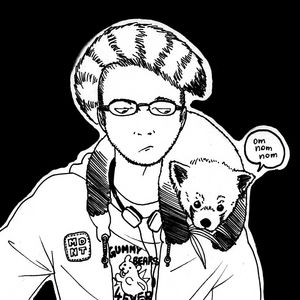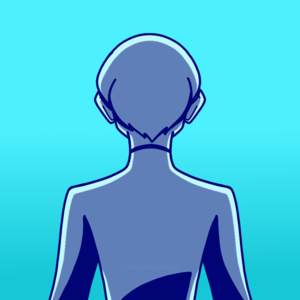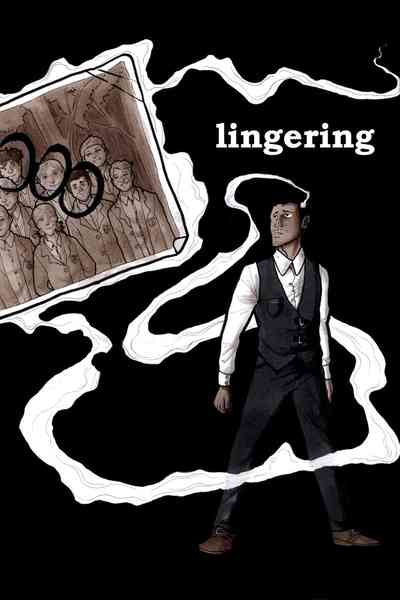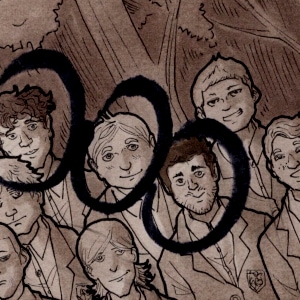As always, Isaiah arrived at the meet-up spot early. He was sitting in a lovely café snuggled deep inside one of the labyrinthine narrow streets spreading from Serenity square, the main public forum of Strona. Through the window he could see people going about their everyday lives, many of them carrying bags with a stylized uppercase M – this, as Isaiah learned, being the logo of Mills’, Strona’s own chain of large department stores, the largest of which was situated near the square itself. He went there with Nigel once, and they were left gobsmacked by the sheer variety of merchandise available. There were exotic fruits and vegetables neither of them could name, a luxury that came at a predictably exorbitant price.
Isaiah’s caramel tea was already starting to cool when Milton walked into the café, looking as high-strung and bashful as when he’d last seen him. He scanned the interior, then noticed Isaiah’s raised hand and dawdled up to the table.
“Sorry I’m late,” he said quietly as he sat down.
“Don’t worry about it,” Isaiah shrugged it off. “What’ll you have?”
“Oh, I don’t have to get anything,” Milton replied, as if he thought that ordering something would be an inconvenience.
“Nonsense, it’s my treat,” Isaiah smiled.
After Milton was finally convinced to have a lemon and ginger tea, the two of them got down to business.
“You said you had something important to tell me about Milo Bax?” Isaiah began.
“Yes…” Milton said in a hushed voice. “It took me a while, but my father finally agreed to talk to me about him.”
“How did you manage that?” Isaiah was curious. “My phone call with him lasted all of two seconds.”
“That sounds like him,” Milton said, slightly unnerved. “My father is a… difficult man. But even he could understand that I was coming from an honest place. Milo is my closest relative outside of my parents. I wanted to know his story.”
“Fair enough,” Isaiah answered. “So, what happened with Milo after graduation?”
“Unfortunately, he, er… fell into some very bad company,” Milton said. “He started using, and then eventually selling opiates on the black market. My father remembered him frequenting a disgusting tavern. He went in there to take him home one day. When he saw the kind of clientele they had, and how chummy they were with his brother… well, he just put two and two together.”
“This tavern, where is it?” Isaiah asked.
“I, er… I actually went there,” Milton said shyly. “I feel like I’ll need to be scrubbed with a brush for weeks just to get the sleaziness out of me, but it was worth it. The guy who owns it doubles as a dealer under the counter. He knew Milo and his crowd from way back in the days. They brought good business.”
“Just how old is this man?”
“I would say… mid-seventies?” Milton guessed. “He very much looks the part. If he weren’t selling drugs in a sketchy bar, I could easily imagine him as a pirate or something.”
“He’s been at this for more than half a century now and he hasn’t been busted yet?” Isaiah asked incredulously.
“Well,” Milton turned around nervously, “he did mention that the police often turn a blind eye because he makes it worth their while. If you know what I mean. That’s why he was comfortable talking to me about it. ‘Doesn’t matter if you tell anyone what you heard’, he said. ‘I have friends in high places.’”
“I see,” Isaiah nodded. “And how exactly did he know that the person you were asking about was the same person that helped his buisiness all those years ago?”
“I actually showed him a photo of Milo,” Milton said. “I’d found it in the yearbooks of Gresham Barlow Academy – they’re available in the library, so there was no need to involve the Archive. I checked out the yearbook and brought it with me.”
“That was clever of you,” Isaiah grinned, and Milton just turned to the side and blushed. He was clearly not used to receiving compliments.
“Anyway, he remembered Milo, or ‘Baxter’ as they called him then,” Milton continued. “His group frequented the bar, so he often had contact with them. He was the one who told me what happened to Milo.”
“And?” Isaiah said, nearly on the edge of his chair.
“He died,” Milton said awkwardly. “He just didn’t appear one day, and when the owner talked to the rest of the group, he found out that Milo took some pretty bad stuff and overdosed. There was no saving him.”
“He died?”, Isaiah repeated wide-eyed. “That… doesn’t make sense. A lot of it doesn’t make sense, actually.”
“What do you mean?” Milton asked, sipping from a shaky teacup.
“One of the first things I checked in the Archive were death records. There is no record of a deceased person named Milo Bax. I checked thoroughly. Three times.”
“Well, he did overdose on drugs…”
“That’s irrelevant. He didn’t just disappear when he took the drug. He was only out of high school at the time – surely his family would notice he was gone. They would inform the police, who would inform the doctors, who would determine the death and its cause. It would be very difficult for a young adult’s death by overdose to escape the records.”
“The thing is,” Milton said wearily. “My grandparents… and my father… they gave up on Milo at that point. They essentially disowned him. My father said that his parents knew that he was dead the moment he didn’t return home one that day.”
“And they never filed a missing person report?” Isaiah said with disbelief. Milton just shook his head.
“That’s very hard to believe, Milton,” Isaiah recoiled with disgust. “Nobody’s that cold.”
Milton just stared into space silently.
“The information you have sounds very suspect,” Isaiah said. “There was nothing to point to where Milo is now. No death record, no missing person report, no story in the news. That’s what made his case so difficult. For you to give me such a clear, conclusive explanation… It doesn’t add up.”
“Secondly,” Isaiah added, “I spoke to someone who knew Milo personally during his Academy days. The Milo from that story doesn’t sound like the type of person who would get involved with opiates and illegal activities. The profiles don’t match up.”
Milton lowered his head, looking like a child that had just been chastised.
“You didn’t tell me that,” he mumbled.
“Pardon?” Isaiah asked, raising an eyebrow.
“You didn’t tell me you talked to someone who knew Milo,” Milton said more clearly. “And that you had an idea of his personality.”
“I fail to see why this would be relevant,” Isaiah said.
“Well, if I had seen your notes beforehand, I might’ve done things differently. It would’ve changed the type of questions I’d be asking…”
“But it wouldn’t have changed the answers you got, Milton,” Isaiah interrupted him, still unflustered but slightly apprehensive. “That bar owner would have told you what he knew about Milo no matter what you read in my notes. I’m not sure I really understand what you’re going for or why my notes are important here.”
“You’re right… I suppose,” Milton said, lowering his head again.
Neither of them said anything for a few minutes. Isaiah leaned back into his chair, resting his chin on his crossed fingers. Something definitely wasn’t adding up in Milton’s story.
“I’d like…” Milton spoke up before Isaiah could say anything. “I’d like to see the photo with the lingering spirit.”
“Why?” Isaiah asked plainly.
“I can sense spirits too,” he said bashfully. “If I touch the photo, perhaps I could give you a different kind of insight. Everyone senses spirits differently, after all. Maybe I would pick up on something you didn’t.”
Isaiah furrowed his brow.
Milton had a point there. If you gave two people a slice of the same strawberry cake, or played them a recording of the same song, their experiences would significantly differ. In much the same way, an individual’s impression of a spirit was just that – individual. Different people would get different vibes from the same phenomenon, and it would make sense to allow another spiritualist to give their take on the photo.
On the other hand, the conversation was starting to rub Isaiah the wrong way. He wasn’t entirely sure if Milton had said that because he thought it would help solving the case, or if he said it just because it was the right thing to say in order to pursue some ulterior motive.
“We could definitely meet again and I could bring the photo with me,” Isaiah agreed.
“Can we do it now? I could come with you to your place and you could show it to me right away.”
“Are you in some kind of hurry?” Isaiah asked calmly, and Milton suddenly did the last thing Isaiah expected him to.
He banged his fists against the table, causing some of the patrons to turn around and gawk at the scene. It was such an unusual sight, this retiring, quiet young man suddenly doing something so brash and attention-grabbing.
“You don’t understand at all,” Milton squeezed through his teeth. “This… This is all I have. My only chance to make something of myself. So… please excuse me if my heart and soul is in it completely.”
“Milton,” Isaiah said while looking straight into his eyes. “You cannot allow your sense of value to hinge on something external like professional achievement. You have your own value because you’re you. You’re deserving of love and attention on your own. That’s not going to change even if you spend the rest of your life doing absolutely nothing.”
Milton just stared back at him utterly confused, as if cogs that had been left to rust a long time ago finally began to turn inside his head.
“But if this means so much to you,” Isaiah added, “I’ll take you to my place and you can see the photo right away. I just need to make a phone call before we go and reschedule my doctor’s appointment.”
“Th… Thank you!” Milton exclaimed, his eyes lighting up in appreciation. Isaiah went to the counter to pay their tab and use the phone, and then the two of them left the café and got on the tram. It was a short and quiet trip to Isaiah’s neighborhood, and soon enough they were standing in front of Muriel Greenwood 37.
The climb up the stairs was oddly tense, as both men kept quiet. The silence was finally broken when Isaiah unlocked the door to his apartment.
“Come right in,” he welcomed his guest, and Milton stepped into the hallway, his eyes wandering around the unfamiliar space.
“You can go to the dining room, it’s right down the hall,” Isaiah said as he slid open the kitchen door to his right. “I’ll be with you in a minute.”
Milton walked down the hall slowly, his shoes clacking against the hardwood floor. When he made it to the dining room, his eyes shifted immediately to an object on the big table next to him.
It was a leather notebook with a pencil next to it. Isaiah’s notes.
With the deliberate action of a predator seizing its prey, he grabbed the notebook and opened it up. He nearly choked as he read the words written on the page.
Just what do you think you’re doing?
Milton just stood there, frozen in place, not comprehending what was going on. He started looking around the room, his skin tingling with the feeling of being watched. Suddenly, his gaze landed on something, and he nearly choked for a second time.
He was staring at a square opening in the dining room wall, the purpose of which was utterly unclear. Staring right back at him through the hole were two pairs of eyes.
It took Milton a few moments to snap out of his shock, drop the notebook and scramble back into the hallway, towards the exit. But the kitchen suddenly slid open to his left and Isaiah and Nigel burst out in front of him, blocking his way.
They walked towards him, forcing him back into the dining room. Sweat dripping down his face, tears welling up in the corners of his eyes, Milton had found himself way out of his league.
He was now facing two men, both a full head taller than him. One of them was Isaiah, whose usually amiable façade was replaced by a quiet intensity. The other was a slightly burlier guy with jet black hair and beard, attempting to project menace in a polka dot apron and with a frying pan in hand.
“What… What is this???” Milton cowered.
“A trap, Milton,” Isaiah said calmly. “You set yourself up for it, frankly. Put the goddamn pan down, Nigel,” he then added, noticing that Milton’s eyes were fixated on the deadly weapon.
“How did you…” Milton whimpered.
“With all due respect, Milton,” Isaiah stopped him, “I’m going to be asking the questions now.”












Comments (2)
See all